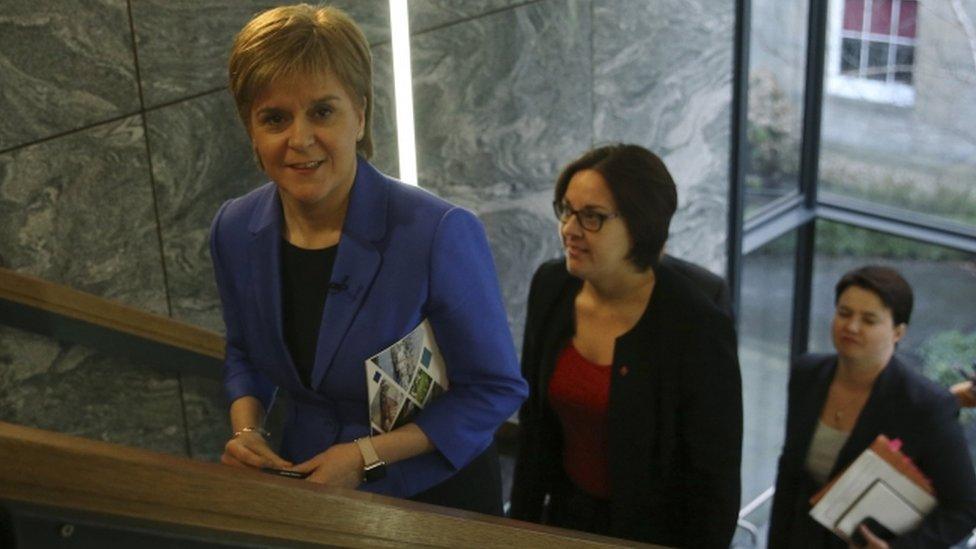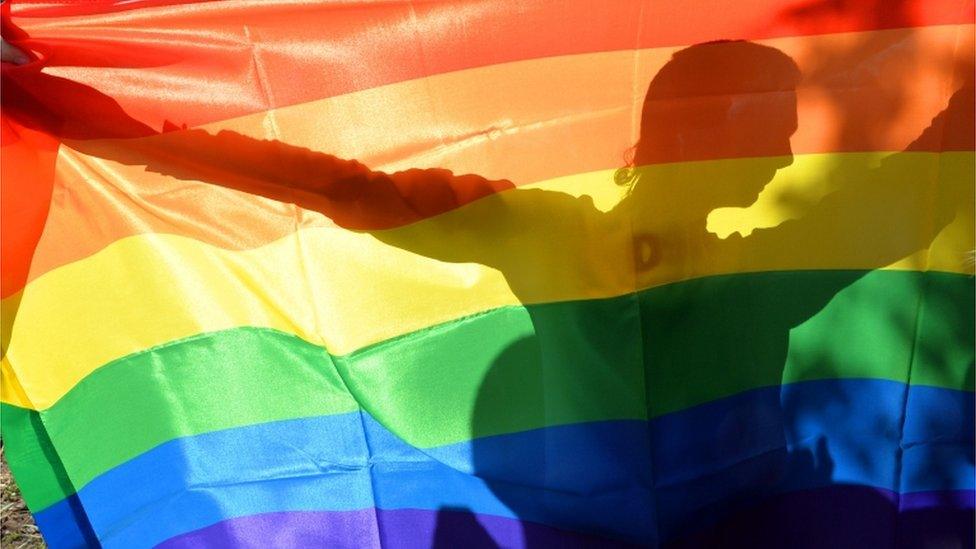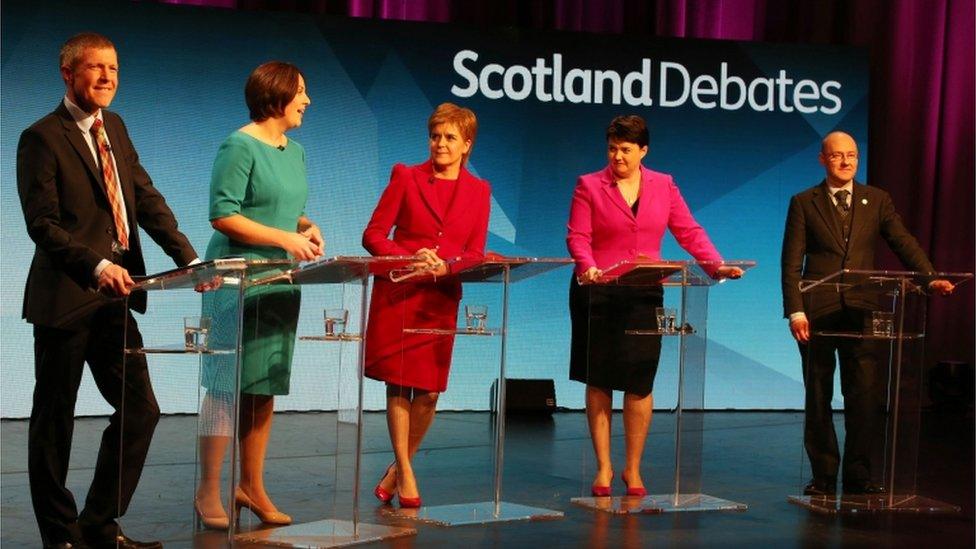Nicola Sturgeon makes gender recognition pledge
- Published

Nicola Sturgeon, Kezia Dugdale and Ruth Davidson joined Willie Rennie and Patrick Harvie at an LGBTI hustings event in Edinburgh on Thursday
Nicola Sturgeon has promised to review and reform gender recognition law for transgender people as part of a series of commitments on LGBTI equality.
The SNP leader unveiled the pledge ahead of a hustings event with the other main party leaders in Edinburgh.
Labour, the Conservatives, Lib Dems and Scottish Greens also back greater rights and support for LGBTI people.
Campaigners welcomed the plans, which they said could allow young people to legally change their gender.
They also said it could mean the law would recognise that some people have a non-binary gender and are neither men nor women.
Scottish Labour said its manifesto would pledge to remove the psychiatric diagnosis requirement from legal gender recognition.
The Scottish Conservatives, Scottish Liberal Democrats and Scottish Greens have called for teachers to be better equipped to deal with LGBTI issues.
Scotland was last year rated the best country in Europe in terms of legal equality for lesbian, gay, bisexual, transgender and intersex people.
But Ms Sturgeon said more work still needed to be done, and the SNP would look to create "refreshed, age-appropriate strategies and resources" for children to promote tolerance and respect, and prevent prejudice about healthy relationships if it wins the election on 5 May.
Under her plans, all new guidance and promoted teachers would also undertake training on equality so they could tackle prejudice-based bullying in schools.
Ms Sturgeon said young people should be supported to make informed choices about their gender and sexual identity.

Scotland became the 17th country in the world to legalise gay marriage when the law was changed in 2014
In addition, she said an SNP government would work towards every professional working with children being trained on equality and tackling prejudice-based bullying.
And it would aim for all police officers to receive appropriate training on the investigation of hate crime.
Ms Sturgeon said she was proud that Scotland had made "significant progress" on LGBTI equality in recent years, with the country having legalised gay marriage in February 2014.
She added: "Tolerance, respect, inclusion - these are attitudes and principles we want to encourage and foster in a modern, fairer Scotland.
"Enabling young people to make informed choices about their gender and sexual identity is about supporting them to be themselves so that they might fulfil their potential.
"I am hopeful that in the next Scottish Parliament we can build as much consensus on LGBTI issues as we did in this session - and take another leap forward for equality."
'Medical diagnosis'
James Morton, manager of the Scottish Transgender Alliance, welcomed the pledges, which he said were in line with international best practice.
He added: "That would mean enabling people to change the gender on their birth certificate without intrusive medical diagnosis, recognising trans people as the experts on their own identities.
"It would allow young people to legally change their gender, with parents' support if under 16.
"It would also mean the law recognising that some people have a non-binary gender, that is they are neither men nor women."
But the Free Church of Scotland moderator, Rev David Robertson, warned against "destroying the traditional idea of gender".
He added: "We believe that this will result in confusion and brokenness amongst our children rather than fulfilled potential."

Where do the other parties stand?

Scottish Labour leader Kezia Dugdale said her party's manifesto would commit to legislating to remove the psychiatric diagnosis requirement from legal gender recognition.
She also pledged to reduce to 16 the age at which people can get legal recognition of the gender they live as, and ensure legal protection for people who do not identify as either men or women.
On the education proposals, she added: "We've got to give teachers the confidence to teach LGBT issues whether that's in social education or elsewhere in the curriculum."
Scottish Conservative leader Ruth Davidson said: "I want to get to a stage where absolutely every teacher in every school in Scotland feels equipped to be able to deal with these issues because every child needs to be able to trust the people in their schools."
She called for relationship, sexual health and parenthood education to be updated much more often "to be able to keep up with the kind of evolving relationship that young people have with sexuality and gender and the way in which it is expressed in their schools."
Scottish Liberal Democrat leader Willie Rennie said: "I think we should be making more progress on education. I don't think we should just be training a small number of teachers I think we should be training all teachers.
"We should be getting gender recognition right, we need to remove the archaic system that we have just now. People should have the right to choose for themselves."
Scottish Greens co-convener Patrick Harvie highlighted the "unspoken issue" of faith schools.
He said: "If we're talking about all teachers then we're also talking about all schools.
"And although there is good and bad practice on both sides of the denominational divide, we still aren't acknowledging that a great many young people are being educated in an ethos which says a lot of us in this room are and believe it or not they use this phrase - inherently morally defective."